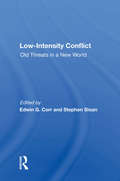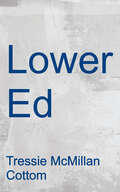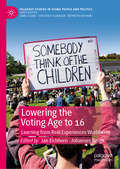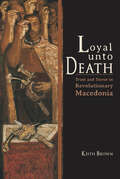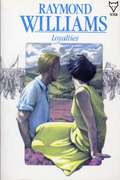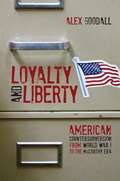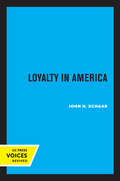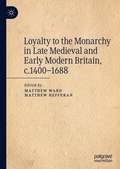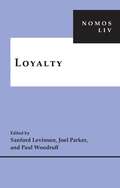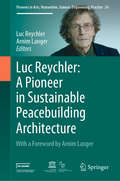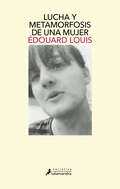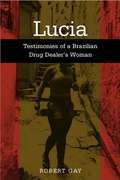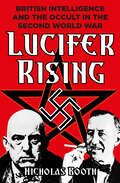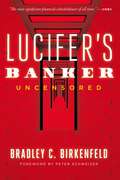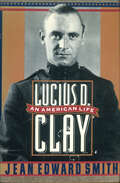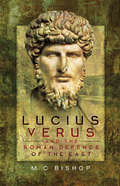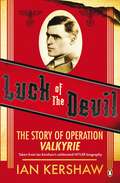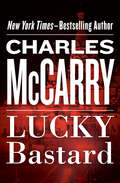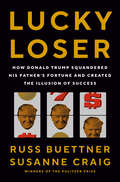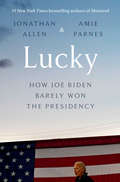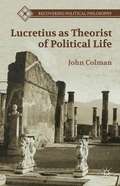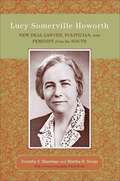- Table View
- List View
Low-intensity Conflict: Old Threats In A New World
by Edwin G CorrThe end of the cold war does not necessarily mean the end of the social and political instability that can lead to low-intensity conflicts. This book provides fresh insights into a difficult subject by bringing together knowledgeable contributors who have the academic expertise, operational experience, and strategic perspective essential to underst
Lower Ed: The Troubling Rise of For-Profit Colleges in the New Economy
by Tressie McMillan CottomLower Ed is quickly becoming the definitive book on the fastest-growing sector of higher education at the turn of the twenty-first century: for-profit colleges. With sharp insight and deliberate acumen, Tressie McMillan Cottom―a sociologist who was once a recruiter at two for-profit colleges―expertly parses the fraught dynamics of this big-money industry. <p><p>Drawing on more than one hundred interviews with students, employees, executives, and activists, Lower Ed details the benefits, pitfalls, and real costs of the expansion of for-profit colleges. Now with a new foreword by Stephanie Kelton, economic advisor to Bernie Sanders's presidential campaign, this smart and essential book cuts to the very core of our nation's broken social contracts and the challenges we face in our divided, unequal society.
Lowering the Voting Age to 16: Learning from Real Experiences Worldwide (Palgrave Studies in Young People and Politics)
by Jan Eichhorn Johannes BerghThis book explores the consequences of lowering the voting age to 16 from a global perspective, bringing together empirical research from countries where at least some 16-year-olds are able to vote. With the aim to show what really happens when younger people can take part in elections, the authors engage with the key debates on earlier enfranchisement and examine the lead-up to and impact of changes to the voting age in countries across the globe. The book provides the most comprehensive synthesis on this topic, including detailed case studies and broad comparative analyses. It summarizes what can be said about youth political participation and attitudes, and highlights where further research is needed. The findings will be of great interest to researchers working in youth political socialization and engagement, as well as to policymakers, youth workers and activists.
Loyal Unto Death: Trust and Terror in Revolutionary Macedonia (New Anthropologies of Europe)
by Keith Brown“The story of the Macedonian Revolutionary Organization (MRO) from its rise until the Illinden Uprising of 1903 . . . a fascinating account.” —PoLARThe underground Macedonian Revolutionary Organization recruited and mobilized over 20,000 supporters to take up arms against the Ottoman Empire between 1893 and 1903. Challenging conventional wisdom about the role of ethnic and national identity in Balkan history, Keith Brown focuses on social and cultural mechanisms of loyalty to describe the circuits of trust and terror—webs of secret communications and bonds of solidarity—that linked migrant workers, remote villagers, and their leaders in common cause. Loyalties were covertly created and maintained through acts of oath-taking, record-keeping, arms-trading, and in the use and management of deadly violence.“This book is, to my mind, exactly the kind of work that needs to be done in order to understand civil wars, insurgencies, nationalism, and rebellions, and to get away from what the author rightfully critiques as ‘pidgin social science.’” —Chip Gagnon, Ithaca College“An innovative work that should inspire debate.” —Slavic Review“A subtle and compelling account of revolutionary insurgency in turn-of-the-century Macedonia. His analytical focus on loyalties, rather than identities, goes beyond critiques of nationalism in enabling powerful new understandings of the region’s histories and its continuing social dynamics.” —Jane K. Cowan, University of Sussex
Loyal to the Sky: Notes from an Activist
by Marisa HandlerCombining captivating personal memoir and astute political reportage, Marisa Handler offers a fascinating inside look at the burgeoning global justice movement through her own compelling coming-of-age story. Born in apartheid South Africa, Handler emigrated to Southern California at the age of twelve. Her gradual realization that injustice existed even in this more open, democratic society spurred a lifelong commitment to activism that would take her around the world and back again. Handler shares intimate details of her life as a global justice activist to offer a revealing perspective on what drives the movement. Tracing her own evolution as an activist, her story crisscrosses the globe, examining current sociopolitical issues from apartheid and racism to the Israeli-Palestinian conflict, corporate globalization, and the wars of the Bush administration. Along the way, Handler paints compelling portraits of the people she's encountered, shares gritty details of the sometimes-harrowing events that have changed and shaped her, and describes how she came to advocate a spiritually based, nonviolent activism as the best means for building the kind of world we wish to see.
Loyalties
by Raymond WilliamsWhat is loyalty? What is treachery? What does it mean to find that one of your friends is a spy? Loyalties traces the fortunes of a group of friends, some from the Welsh valleys, some from Cambridge, from the Spanish Civil War to the 1984 miners' strike, combining the tension of a first-class thriller with a brilliant analysis of our age.
Loyalties: A Son's Memoir
by Carl BernsteinThe events that shaped the author's childhood and led to the persecution of his parents during the McCarthy era.
Loyalty and Liberty: American Countersubversion from World War 1 to the McCarthy Era
by Alex GoodallLoyalty and Liberty offers the first comprehensive account of the politics of countersubversion in the United States prior to the McCarthy era. Alex Goodall traces the course of American countersubversion over the first half of the twentieth century, culminating in the rise of McCarthyism and the Cold War. This sweeping study explores how antisubversive fervor was dampened in the 1920s in response to the excesses of World War I, transformed by the politics of antifascism in the Depression era, and rekindled in opposition to Roosevelt's ambitious New Deal policies in the later 1930s and 1940s. Varied interest groups such as business tycoons, Christian denominations, and Southern Democrats as well as the federal government pursued their own courses, which alternately converged and diverged, eventually consolidating into the form they would keep during the Cold War. Rigorous in its scholarship yet accessible to a wide audience, Goodall's masterful study shows how the opposition to radicalism became a defining ideological question of American life.
Loyalty in America
by John H. SchaarThis title is part of UC Press's Voices Revived program, which commemorates University of California Press’s mission to seek out and cultivate the brightest minds and give them voice, reach, and impact. Drawing on a backlist dating to 1893, Voices Revived makes high-quality, peer-reviewed scholarship accessible once again using print-on-demand technology. This title was originally published in 1957.
Loyalty to the Monarchy in Late Medieval and Early Modern Britain, c.1400-1688
by Matthew Ward Matthew HefferanThis book explores the place of loyalty in the relationship between the monarchy and their subjects in late medieval and early modern Britain. It focuses on a period in which political and religious upheaval tested the bonds of loyalty between ruler and ruled. The era also witnessed changes in how loyalty was developed and expressed. The first section focuses on royal propaganda and expressions of loyalty from the gentry and nobility under the Yorkist and early Tudor monarchs, as well as the fifteenth-century Scottish monarchy. The chapters illustrate late-medieval conceptions of loyalty, exploring how they manifested themselves and how they persisted and developed into early modernity. Loyalty to the later Tudors and early Stuarts is scrutinised in the second section, gauging the growing level of dissent in the build-up to the British Civil Wars of the seventeenth century. The final section dissects the role that the concept of loyalty played during and after the Civil Wars, looking at how divergent groups navigated this turbulent period and examining the ways in which loyalty could be used as a means of surviving the upheaval.
Loyalty: NOMOS LIV (NOMOS - American Society for Political and Legal Philosophy #14)
by Paul Woodruff Sanford Levinson Joel ParkerFew topics are more ubiquitous in everyday life and, at the same time, more controversial in practice, than that of one’s moral obligation to loyalty. Featuring essays by scholars working in a variety of subjects from law to psychology, Loyalty presents diverse perspectives on dilemmas posed by potential conflicts between loyalties to specific institutions or professional roles and more universalistic conceptions of moral duty. The volume begins with a philosophical exploration of theories of loyalty, both Eastern and Western, then moves to examine several problematic situations in which loyalty is often a factor: partisan politics, the armed forces, and lawyer-client relationships. A fair and balanced analysis from a wide range of disciplinary and normative viewpoints, Loyalty infuses new life into an oft-tread avenue of scholarly inquiry. Contributors: Ryan K. Balot, Paul O. Carrese, Yasmin Dawood, Bernard Gert, Kathleen M. Higgins, Sanford Levinson, Daniel Markovits, Lynn Mather, Russell Muirhead, Nancy Sherman, Paul Woodruff
Luc Reychler: A Pioneer in Sustainable Peacebuilding Architecture (Pioneers in Arts, Humanities, Science, Engineering, Practice #24)
by Arnim Langer Luc ReychlerThis book provides a unique personal perspective on the field of peace research. It not only highlights Luc Reychler’s significant contributions to the theory and praxis of sustainable peacebuilding, but also offers important reflections on the evolution of peace research as an independent discipline. The central concept of this book – and of Reychler’s academic career, for that matter – is sustainable peacebuilding architecture. Reychler introduced this concept in order to draw attention to the architectural principles and considerations that have to be addressed in sustainable peacebuilding processes. Reychler’s work on sustainable peacebuilding architecture has been groundbreaking and has not lost any of its relevance in the twenty-first century. By bringing together Reychler’s seminal texts on sustainable peacebuilding architecture, the current book aims to offer academics, students and policymakers an essential guide to understanding, studying and applying this crucial concept.• Provides a unique personal view of the development of peace research• Lists the necessary building blocks for sustainable peacebuilding• Offers tools for monitoring and evaluating interventions• Discusses the scientific nature and often provocative findings of peace research • Discusses ten lessons learned and the future (Peace Research III)
Lucha y metamorfosis de una mujer
by Édouard LouisLa heroica transformación de una madre en un mundo dominado por los hombres. Édouard Louis se ha convertido en una de las plumas más temidas entre el poder establecido. Dotado de un estilo singular y una voz inconfundible, el nuevo enfant terrible de las letras galas ha transformado sus experiencias y sentimientos más íntimos en lacerantes historias de denuncia y catarsis, como su violación en vísperas de Navidades en Historia de la violencia o la tormentosa relación paternofilial en Quién mató a mi padre. En Lucha y metamorfosis de una mujer, Louis prosigue su ambicioso proyecto autobiográfico, que en esta ocasión focaliza en la figura de su madre, una mujer «apartada de todo, sojuzgada e incluso a veces humillada por la violencia masculina, que a los cuarenta y cinco años se rebeló, huyó y, poco a poco, construyó su libertad». La crítica ha dicho...«El escritor hace un retrato desu madre como una mujer destruida por la sociedad, la familia e incluso su hijo... antes de celebrar su reencuentro. Brillante.»Télérama «Dedicado a su madre, este libro parece en muchos sentidos el envés de Quién mató a mi padre. Y la dimensión teatral del texto hace que el orgullo de ser hijo de esta mujer sea sensible y conmovedor.»Le Monde «Un libro sobre lo que el autor llama la arqueología de la destrucción de su madre. Un texto breve, a la vez que duro y profundamente conmovedor, que devuelve la dignidad a la madre.»La Presse «Desde Para acabar con Eddy Bellegueule, Édouard Louis ha demostrado y desmontado la violencia de la dominación. Después de Quién mató a mi padre, dedica Lucha y metamorfosis de una mujer a su madre. Una demostración implacable.»La Libre Belgique «Este pequeño libro trata de la reconstrucción. O de cómo una mujer sobrevivió a lo que debería haberla destrozado. [...] La metamorfosis de una madre y también la metamorfosis de un hijo.»Bibliobs «El viaje de una víctima de la violencia social y patriarcal hacia su emancipación. [...] Un fresco autobiográfico que dibuja un "mapa del mundo social".»LesInrocks
Lucia: Testimonies of a Brazilian Drug Dealer's Woman
by Robert Gay"Favelas, or shantytowns, are where cocaine is mainly sold in Rio de Janeiro. There are some six hundred "favelas in the city and most of them are controlled by well-organized and heavily armed drug gangs. The struggle for the massive profits from this drug trade has resulted in what are increasingly violent and deadly confrontations between rival drug gangs and a corrupt and brutal police force, that have transformed parts of the city into a war-zone. "Lucia tells the story of one woman who was once intimately involved with drug gang life in Rio throughout the 1990s. Through a series of conversations with the author, Lucia describes conditions of poverty, violence and injustice that are simply unimaginable to outsiders. In doing so, she explains why women like her become involved with drugs and gangs and why this situation is unlikely to change.
Lucifer Rising: British Intelligence and the Occult in the Second World War
by Nicholas BoothLucifer Rising unravels for the first time the myths surrounding the most surreal yet, ultimately, seriously-intended secret operations of the Second World War when Britain stood alone against the Nazis. Featuring an eccentric cast of characters, including the creator of James Bond, the self-proclaimed ‘wickedest man in the world’, a cross-dressing astrologer and the Deputy Führer, bestselling author Nicholas Booth weaves together an incredible narrative about spying, sabotage, weird inventions, black propaganda and even the attempted harnessing of the occult as the British secret service sought desperately to gain the upper hand over the Nazis by whatever means possible. Using hitherto secret files – many only recently released – Lucifer Rising shows how nothing was considered too outrageous in the desperate fight against the Nazi regime, including the attempted manipulation of the occult and astrology with often unintentionally hilarious results.
Lucifer's Banker Uncensored: The Untold Story of How I Destroyed Swiss Bank Secrecy
by Bradley C. BirkenfeldA page-turning real-life thriller, Lucifer's Banker Uncensored is a fascinating behind-the-scenes look at the secret Swiss high-net worth banking industry and a harrowing account of our government's justice system. Updated and Uncensored! As a private banker working for the largest bank in the world, UBS, Bradley Birkenfeld was an expert in Switzerland's shell-game of offshore companies and secret numbered accounts. He wined and dined ultrawealthy clients whose millions of dollars were hidden away from business partners, spouses, and tax authorities. As his client list grew, Birkenfeld lived a life of money, fast cars, and beautiful women, but when he discovered that UBS was planning to betray him, he blew the whistle to the US Government. The Department of Justice scorned Birkenfeld's unprecedented whistle-blowing and attempted to silence him with a conspiracy charge. Yet Birkenfeld would not be intimidated. He took his secrets to the US Senate, the Securities and Exchange Commission, and the Internal Revenue Service, where he prevailed. His bombshell revelations helped the US Treasury recover over $15 billion (and counting) in back taxes, fines, and penalties from American tax cheats. But Birkenfeld was shocked to discover that at the same time he was cooperating with the US Government, the Department of Justice was still doggedly pursuing him. He was arrested and served thirty months in federal prison. When he emerged, the Internal Revenue Service gave him a whistle-blower award for $104 million, the largest such reward in history. A page-turning real-life thriller, Lucifer's Banker Uncensored is a fascinating behind-the-scenes look at the secret Swiss high-net worth banking industry and a harrowing account of our government's justice system. Readers will follow Birkenfeld and share his outrage with the incompetence and possible corruption at the Department of Justice, and they will cheer him on as he ''hammers'' one of the most well-known and powerful banks in the world.
Lucius D. Clay: An American Life
by Jean Edward SmithSoldier, statesman, logistical genius: Lucius D. Clay was one of that generation of giants who dedicated their lives to the service of this country, acting with ironclad integrity and selflessness to win a global war and secure a lasting peace. A member of the Army's elite Corps of Engineers, he was tapped by FDR in 1940 to head up a crash program of airport construction and then, in 1942, Roosevelt named him to run wartime military procurement. For three years, Clay oversaw the requirements of an eight-million-man army, setting priorities, negotiating contracts, monitoring production schedules and R&D, coordinating military Lend-Lease, disposing of surplus property-all without a breath of scandal. It was an unprecedented job performed to Clay's rigorous high standards. As Eliot Janeway wrote: "No appointment was more strategic or more fortunate."If, as head of military procurement, Clay was in effect the nation's economic czar, his job as Military Governor of a devastated Germany was, as John J. McCloy has phrased it, "the nearest thing to a Roman proconsulship the modern world afforded." In 1945, Germany was in ruins, its political and legal structures a shambles, its leadership suspect. Clay had to deal with everything from de-Nazification to quarrelsome allies, from feeding a starving people to processing vast numbers of homeless and displaced. Above all, he had to convince a doubting American public and a hostile State Department that German recovery was essential to the stability of Europe. In doing so, he was to clash repeatedly with Marshall, Kennan, Bohlen, and Dulles not only on how to treat the Germans but also on how to deal with the Russians. In 1949, Clay stepped down as Military Governor of Germany and Commander of U.S. Forces in Europe. He left behind a country well on the way to full recovery. And if Germany is today both a bulwark of stability and an economic and political success story, much of the credit is due to Clay and his driving vision.Lucius Clay went on to play key roles in business and politics, advising and working with presidents of both parties and putting his enormous organizing skills and reputation to good use on behalf of his country, whether he was helping run Eisenhower's 1952 campaign, heading up the federal highway program, raising the ransom money for the Bay of Pigs prisoners, or boosting morale in Berlin in the face of the Wall. The Berliners in turn never forgot their debt to Clay. At the foot of his West Point grave, they placed a simple stone tablet: Wir Danken Dem Bewahrer Unserer Freiheit- We Thank the Defender of Our Freedom.
Lucius Verus and the Roman Defence of the East
by M.C. Bishop&“The first biography of Marcus Aurelius&’ adopted brother and co-emperor . . . a valuable read for anyone with an interest in Roman history.&”—The NYMAS Review Lucius Verus is one of the least regarded Roman emperors, despite the fact that he was co-ruler with his adoptive brother Marcus Aurelius for nine years until his untimely death. The later sources were strangely hostile to him and modern writers tend to dismiss him, but contemporary writings shine a more favorable light on his accomplishments. His handling of military affairs, particularly the conflict with Parthia after their invasions of Armenia and Syria, deserves a new consideration in the light of a careful reassessment of all the available source material. This volume looks at the upbringing of the boy who lost two fathers, acquired a brother, had his name changed twice, became a general overnight, and commanded the army that defeated one of Rome&’s greatest foes in the 2nd century AD. His rise to power is placed in the context of Rome&’s campaigns in the East and the part played by all—from the ordinary soldiers up to the aristocracy who commanded them—in making Lucius Verus&’s Parthian Wars a success. &“Bishop&’s background is in Roman military archaeology, and where the details of Roman warfare are concerned, he knows his subject matter backwards and forwards . . . For those who wish to understand how the Roman commanders fighting under Verus achieved success in the East, Bishop&’s book can be heartily recommended.&”—Bryn Mawr Classical Review
Luck of the Devil: The Story of Operation Valkyrie
by Ian Kershaw'It is now time that something was done. But the man who has the courage to do something must do it in the knowledge that he will go down in German history as a traitor. If he does not, however, he will be a traitor to his own conscience' Colonel Claus von Stauffenberg, July 1944The July 1944 Plot to kill Adolf Hitler was a desperate attempt by a group of senior officers to redeem Germany's honour and end the Second World War. They were heroic because they knew their chances of success were slight and that the result of their failure would undoubtedly be a terrible death. They wanted to leave a message for later generations: that there were Germans who understood the evils of Nazism and were willing to act against it. This extraordinary story is the basis for Bryan Singer's major new film Valkyrie, due to be released in February 2009. Published for the first time as a separate book, Luck of the Devil is taken from Ian Kershaw's bestselling Hitler 1936-1945: Nemesis and is a brilliant account of just what happened in those fateful days at Hitler's Wolf's Lair headquarters, when his opponents came so astonishingly close to assassinating what is one of the modern era's most terrible figures.
Lucky Bastard: A Novel
by Charles McCarryThe KGB grooms a long-lost Kennedy for an explosive assignment in this thriller by an ex-CIA agent and New York Times–bestselling spy novelist. Although in the mid-1940s no one had ever heard of JFK, Jack Adams&’s mother insisted her new son be christened John Fitzgerald. Years after his parents&’ death, Jack learns the reason for his name: a packet of photos showing his mother in bed with young John Kennedy. As a student at Columbia University, Jack demonstrates that he inherited more than JFK&’s good looks. His irresistible charisma and political instinct make him a natural campus leader, but he has his sights set on something bigger than the student council. Young Jack Adams wants to be president of the United States, and the Soviet Union is prepared to help. A KGB spy named Dmitri recruits Jack, promising him the presidency in exchange for treason. Dmitri guides Jack for decades, putting him in a position to become the largest intelligence coup in history—unless the candidate&’s libido derails him first.
Lucky Loser: How Donald Trump Squandered His Father's Fortune and Created the Illusion of Success
by Russ Buettner Susanne CraigAn Instant New York Times Bestseller • A Washington Post Notable Book • A Financial Times Best Business Book of the Year&“A first-rate financial thriller . . . Lucky Loser is one of those rare Trump books that deserve, even demand, to be read.&” –Alexander Nazaryan, The New York TimesFrom the Pulitzer Prize-winning reporters behind the 2018 bombshell New York Times exposé of then-President Trump&’s finances, an explosive investigation into the history of Donald Trump&’s wealth, revealing how one of the country&’s biggest business failures lied his way into the White HouseSoon after announcing his first campaign for the US presidency, Donald J. Trump told a national television audience that life &“has not been easy for me. It has not been easy for me.&” Building on a narrative he had been telling for decades, he spun a hardscrabble fable of how he parlayed a small loan from his father into a multi-billion-dollar business and real estate empire. This feat, he argued, made him singularly qualified to lead the country. Except: None of it was true. Born to a rich father who made him the beneficiary of his own highly lucrative investments, Trump received the equivalent of more than $500 million today via means that required no business expertise whatsoever.Drawing on over twenty years&’ worth of Trump&’s confidential tax information, including the tax returns he tried to conceal, alongside business records and interviews with Trump insiders, New York Times investigative reporters Russ Buettner and Susanne Craig track Trump's financial rise and fall, and rise and fall again. For decades, he squanders his fortunes on money losing businesses, only to be saved yet again by financial serendipity. He tacks his name above the door of every building, while taking out huge loans he&’ll never repay. He obsesses over appearances, while ignoring threats to the bottom line and mounting costly lawsuits against city officials. He tarnishes the value of his name by allowing anyone with a big enough check to use it, and cheats the television producer who not only rescues him from bankruptcy but casts him as a business savant – the public image that will carry him to the White House. A masterpiece of narrative reporting, Lucky Loser is a meticulous examination spanning nearly a century, filled with scoops from Trump Tower, Mar-a-Lago, Atlantic City, and the set of The Apprentice. At a moment when Trump&’s tether to success and power is more precarious than ever, here for the first time is the definitive true accounting of Trump and his money – what he had, what he lost, and what he has left – and the final word on the myth of Trump, the self-made billionaire.
Lucky: How Joe Biden Barely Won the Presidency
by Jonathan Allen Amie ParnesThe inside story of the historic 2020 presidential election and Joe Biden&’s harrowing ride to victory, from the #1 New York Times bestselling authors of Shattered, the definitive account of Hillary Clinton&’s 2016 campaign. Almost no one thought Joe Biden could make it back to the White House—not Donald Trump, not the two dozen Democratic rivals who sought to take down a weak front-runner, not the mega-donors and key endorsers who feared he could not beat Bernie Sanders, not even Barack Obama. The story of Biden&’s cathartic victory in the 2020 election is the story of a Democratic Party at odds with itself, torn between the single-minded goal of removing Donald Trump and the push for a bold progressive agenda that threatened to alienate as many voters as it drew. In Lucky, #1 New York Times bestselling authors Jonathan Allen and Amie Parnes use their unparalleled access to key players inside the Democratic and Republican campaigns to unfold how Biden&’s nail-biting run for the presidency vexed his own party as much as it did Trump. Having premised his path on unlocking the Black vote in South Carolina, Biden nearly imploded before he got there after a relentless string of misfires left him freefalling in polls and nearly broke. Allen and Parnes brilliantly detail the remarkable string of chance events that saved him, from the botched Iowa caucus tally that concealed his terrible result, to the pandemic lockdown that kept him off the stump, where he was often at his worst. More powerfully, Lucky unfolds the pitched struggle within Biden&’s general election campaign to downplay the very issues that many Democrats believed would drive voters to the polls, especially in the wake of Trump&’s response to nationwide protests following the murder of George Floyd. Even Biden&’s victory did not salve his party&’s wounds; instead, it revealed a surprising, complicated portrait of American voters and crushed Democrats&’ belief in the inevitability of a blue wave. A thrilling masterpiece of political reporting, Lucky is essential reading for understanding the most important election in American history and the future that will come of it.
Lucretius As Theorist of Political Life
by John ColmanLucretius as Theorist of Political Life is an interpretation of Lucretius' poem On the Nature of Things as a defense of philosophy given the irremediable tension between the competing claims of the philosophic and political life. The central issue is the need for, and attempt by, philosophy to justify and defend its way of life to the political community. This work uncovers how Lucretius' conception of the philosophic life, and the reaction to the human, religious, and political implications of the discovery of nature, distinguish his intention from the anti-theological animus that drives the politically and scientifically ambitious project of his modern appropriators.
Lucy Somerville Howorth: New Deal Lawyer, Politician, and Feminist from the South (Southern Biography Series)
by Anne Firor Scott Dorothy S. Shawhan Martha H. SwainBorn, raised, and retired in Mississippi, Lucy Somerville Howorth (1895--1997) was a champion for the rights of women long before feminism emerged as a widely recognized movement. As told by Dorothy S. Shawhan and Martha H. Swain, hers is a remarkable life story-from a small-town upbringing to a career as an attorney, an activist, and the last of a generation of New Deal women in Washington, D.C. She held a presidential appointment under every chief executive from Franklin Roosevelt to John Kennedy.Howorth was a fervent believer in the power of organizations to bring about change, and she became known for her leadership qualities, acumen, and quick appraisal of social problems, particularly as they affected women. Shawhan and Swain point out that her winsome personality, small stature, and delightful sense of humor also aided her as a female aspiring in a man's world. In 1931 she was elected to the Mississippi House of Representatives and, after campaigning for Roosevelt, was rewarded by the new president with a federal appointment. She served in a number of subsequent roles, rising to become general counsel of the War Claims Commission, at that time the highest legal position in an executive commission ever filled by a woman.Howorth worked relentlessly for the advancement of women, especially through the American Association for University Women and the National Federation of Business and Professional Women. She lobbied for equality in the workplace, helping to effect significant advances in government and the professions. In 1944, at the request of Eleanor Roosevelt, Howorth delivered the keynote speech at the White House Conference on Women in Postwar Policy-Making, the most memorable of her many public addresses.This first-ever biography of Howorth bestows long-overdue recognition of her many notable achievements and illuminates the activism of women in the decades often considered to be the doldrums of the women's movement.
Lucy: A Novel
by Ellen FeldmanHistorical fiction centering on the relationship between FDR and Lucy Rutherford Mercer.
